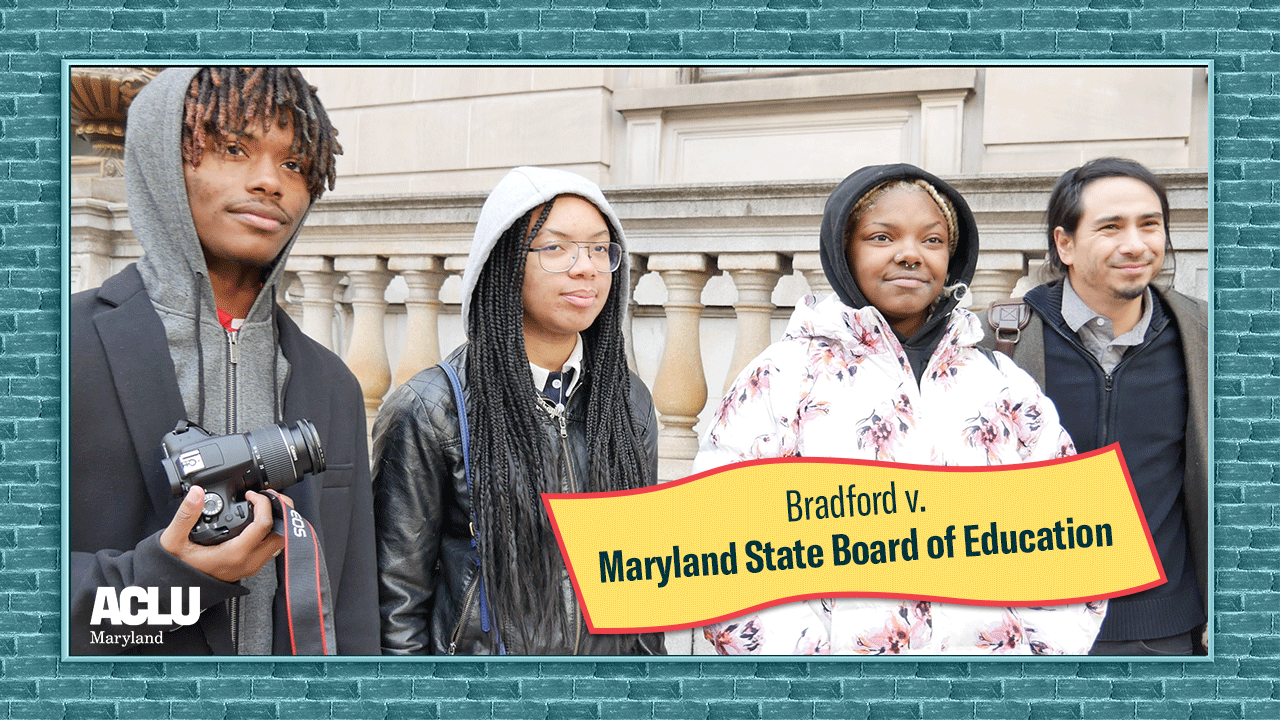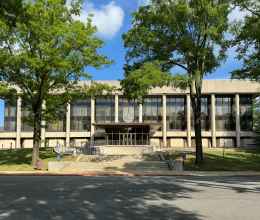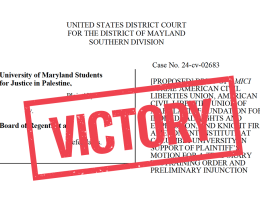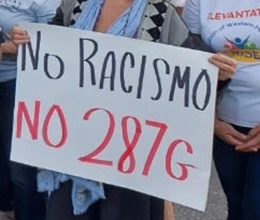
Bradford v. Maryland State Board of Education, a historic and ongoing lawsuit, was originally filed in 1994 on behalf of children and their parents/guardians in the Baltimore City school system to provide the correct funding for a proper education.
A hearing in the case was held on December 14, 2022, and students from the No Boundaries Youth Coalition who lead our local town hall a few days before, attended the hearing and joined us at the courthouse. The request filed in the Circuit Court for Baltimore City seeks further relief in the ongoing historic Bradford lawsuit that ordered a revamping of the state’s education funding formula. It would also hold the State accountable for its failure to provide the necessary funding to both provide a quality education and to address the abysmal physical conditions of school facilities that disrupt students’ ability to learn.
Nehemiah Bester produced and edited this video.
Support Our Work Get Updates
TRANSCRIPT
Janiyha Williams: It's like we're the ones that's living it. I'm class of ’26, so I'm going to be in school for three more years and I need the most out of my schools.
Frank Patinella: The state of Maryland has an obligation to provide a thorough and efficient education to all public school children in Maryland. Bradford versus the State Board of Education specifically focused on Baltimore City's education, children in Baltimore City. As decades and generations of students and families have been subjected to underfunding in their schools.
Khayia Brown: We kind of wasn’t learning anything. So it was like hard. And then, recently we had just got our teacher, and now it’s like we’re way behind.
Devante Dunston: We're the ones who are suffering from it. And I feel like if I have a problem with it, maybe other students have a problem with it. And it’s affecting them academically.
Khayia Brown: We are failing because we don't have any teachers. And it's not our fault that we're failing because we didn't get, we wasn't given any work or learning anything. So our grades are low because we’re not learning.
Frank Patinella: Almost $4 billion is needed in addition to that billion that we secured to modernize all schools. And that money is just not there. So the promise of providing constitutionally adequate funding has been broken.
Jayden Lewis: I feel like, with my voice I can make a change with how schools are struggling or what's going on in the community at the moment. I feel like my voice should be heard for or so I can speak for other students in the school.
Janiyha Williams: Help the kids. Instead of just leaving them with the torn up books that they have, holes in the walls, the water has lead in it, no pencils, no paper. Just helping the kids so they can actually get a better, output from school. And the like, the curriculum has been the same for many years and you know, stuff that worked back then may not work now.
Frank Patinella: Society is sending them the message that their lives are not valued right? That their education doesn't matter. So there needs to be a pedagogical approach to teaching and learning to help students process these things, right. So that they can develop strong identities, strong Black and Brown identities and believe that when they graduate, that they can pursue their dreams.
Khayia Brown: I just want to get the proper learning that I want, in Biology.
Victor Genecin: And the issue in the Bradford case is, that the state is not providing funding that city schools need in order to meet those standards. The city schools do not have enough teachers, they don't have enough teachers because they can't afford to pay them well enough. The city schools do not have enough social workers, they do not have enough administrators, they do not have enough librarians. And then, as you all know, the city schools have facilities that are extremely deteriorated.
Rick Pitts: Baltimore City has a dreadful issue of class sizes. We all know that we don't have enough teachers, y’all can agree upon that right?
Joseph Wong: And so, what the Bradford case is seeking to obtain is an order of the court requiring the state to pay the money that it ought to provide to the city in order for the city to have the educational programs that it needs to have. So what the court did was the court issued an order declaring that there needed to be at least an additional $2,000, $2,600 per student in Baltimore City. Now, what ended up happening is that the state never really lived up to that promise, and that’s part of the reason why we’re coming back to court now. In order to say the state never did what it was supposed to do, Judge, you’re supervising this. We’re asking you to step in and make them pay what Baltimore City is owed.
Rick Pitts: We are taking on this fight by putting pressure on our elected officials. And you know honestly letting them know this is something that means a lot to a lot of the people you represent. And if you don’t listen to this, we’ll let everybody know that you didn’t support us in the one thing that we asked you for and needed. Right? So that’s the other thing, we can talk, right, but we got to put pressure on these folks to let them know I’m not voting for you next time and I’m telling all my friends and family the same thing. That’s the other part of the advocacy. We need to be able to have a voice in that fight.
Frank Patinella: This is a pretty, pretty good picture of what structural racism looks like, right. In terms of this issue of adequate funding.
Rick Pitts: But we still need to put major pressure on all of the city delegation members, as well as the legislature as a whole. We can't let this slip through our fingers again.
Frank Patinella: So we're going to be in court in a week, and that's what we're going to be asking for. We're here. This is Bradford versus the State Board of Education. And today we're going to argue for summary judgment right. The state, we are contending that the state is in violation of their constitutional requirement of providing adequate funding for Baltimore City Schools. For all the resources that are needed for students to meet state adopted educational standards. So that's what we are here today for.
Arielle Humphrey: We’re here today arguing the motions for summary judgment and which we are seeking for the court to declare that the Maryland State Board of Education has been violating the Maryland Constitution by underfunding Baltimore City Public School children for decades and as a result The Baltimore Public School system is struggling and needs increased funds in order to be able to provide students with an education that is adequate by contemporary standards.
Alaizah Koorji: And I'll just add that the Legal Defense Fund brings cases about racial justice and the Baltimore City Schools is comprised mostly in Black and Brown kids who are being denied their constitutional right to a good education. Who have been neglected by the state for decades - this case has been going on for decades. So we're here today to ask the court to demand right now, funding that would start to address the chronic underfunding that the school district has had to suffer from for a number of years.
Janiyha Williams: We want more for our schools. We want more for the kids that are in our community.








